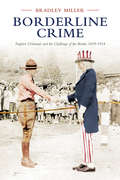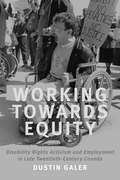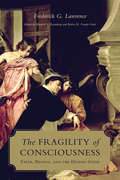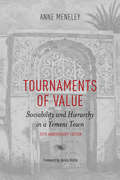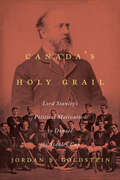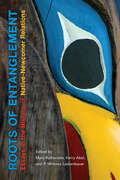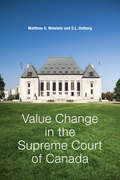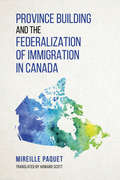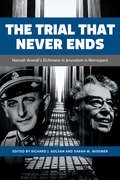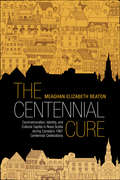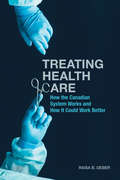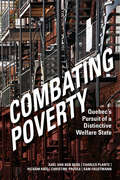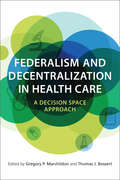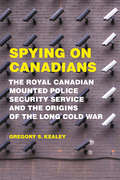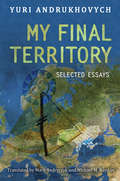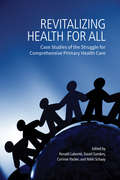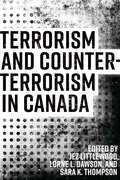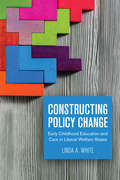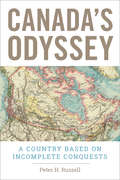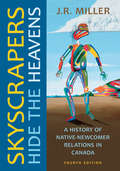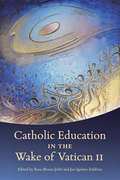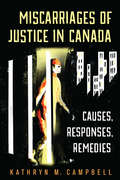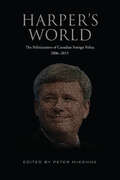- Table View
- List View
Borderline Crime: Fugitive Criminals and the Challenge of the Border, 1819-1914
by Bradley Miller The Osgoode SocietyFrom 1819 to 1914, governments in northern North America struggled to deal with crime and criminals migrating across the Canadian-American border. Limited by the power of territorial sovereignty, officials were unable to simply retrieve fugitives and refugees from foreign territory. Borderline Crime examines how law reacted to the challenge of the border in British North America and post-Confederation Canada. For nearly a century, officials ranging from high court judges to local police officers embraced the ethos of transnational enforcement of criminal law. By focusing on common criminals, escaped slaves, and political refugees, Miller reveals a period of legal genesis where both formal and informal legal regimes were established across northern North America and around the world to extradite and abduct fugitives. Miller also reveals how the law remained confused, amorphous, and often ineffectual at confronting the threat of the border to the rule of law. This engrossing history will be of interest to legal, political, and intellectual historians alike.
Working towards Equity: Disability Rights, Activism, and Employment in Late Twentieth Century Canada
by Dustin GalerIn Working towards Equity, Dustin Galer argues that paid work significantly shaped the experience of disability during the late twentieth century. Using a critical analysis of disability in archival records, personal collections, government publications and a series of interviews, Galer demonstrates how demands for greater access among disabled people for paid employment stimulated the development of a new discourse of disability in Canada. Family advocates helped people living in institutions move out into the community as rehabilitation professionals played an increasingly critical role in the lives of working-age adults with disabilities. Meanwhile, civil rights activists crafted a new consumer-led vision of social and economic integration. Employment was, and remains, a central component in disabled peoples' efforts to become productive, autonomous and financially secure members of Canadian society. Working towards Equity offers new in-depth analysis on rights activism as it relates to employment, sheltered workshops, deinstitutionalization and labour markets in the contemporary context in Canada.
The Fragility of Consciousness: Faith, Reason, and the Human Good
by Frederick Lawrence Kevin Vander Schel Randall S. RosenbergFrederick G. Lawrence is the authoritative interpreter of the work of Bernard Lonergan and an incisive reader of twentieth-century continental philosophy and hermeneutics. The Fragility of Consciousness is the first published collection of his essays and contains several of his best known writings as well as unpublished work. The essays in this volume exhibit a long interdisciplinary engagement with the relationship between faith and reason in the context of the crisis of culture that has marked twentieth- and twenty-first century thought and practice. Frederick G. Lawrence, with his profound and generous commitment to the intellectual life of the church, has produced a body of work that engages with Heidegger, Gadamer, Habermas, Ricoeur, Strauss, Voegelin, and Benedict XVI among others. These essays also explore various themes such as the role of religion in a secular age, political theology, economics, neo-Thomism, Christology, and much more. In an age marked by social, cultural, political, and ecclesial fragmentation, Lawrence models a more generous way – one that prioritizes friendship, conversation, and understanding above all else.
Tournaments of Value: Sociability and Hierarchy in a Yemeni Town
by Anne MeneleyA significant contribution to our understanding of the varied experience of women in the Islamic Middle East, Tournaments of Value gives a careful description of a world of female socializing, and the velocity, energy, and elaborateness of this remarkable female social world. Meneley's data challenges assumptions about the cross-cultural validity of a division between household and community, between domestic and public domains. She demonstrates the fluidity of social life, the shifting nature of community organization, and in doing so provides a welcome counterpoint to more rigid formulations of Middle Eastern social structure usually expressed in ethnographies. Tournaments of Value incorporates vignettes to illustrate more analytical points and to enliven the text, allowing the reader to enter fully into the rich world of Zabid in Yemen. This expanded 20th anniversary edition introduces this seminal work on Middle Eastern ethnography and women's studies to a new generation of readers.
Canada's Holy Grail: Lord Stanley’s Political Motivation to Donate the Stanley Cup
by Jordan B. GoldsteinIn 1892, Lord Frederick Arthur Stanley donated the Dominion Hockey Challenge Cup – later known as the Stanley Cup – to crown the first Canadian hockey champions. Canada’s Holy Grail documents Lord Stanley’s personal politics, his desire to affect Canadian nationality and unity, and the larger transformations in Anglo-liberal political thought at the time. This book posits that the Stanley Cup fit directly within Anglo-American traditions of using sport to promote ideas of the national, and the donation of the cup occurred at a moment in history when Canadian nationalists needed identifying symbols. Jordan B. Goldstein asserts that only with a transformation in Anglo-liberal thought could the state legitimately act through culture to affect national identity. Drawing on primary source documentation from Lord Stanley’s archives, as well as statements by politicians and hockey enthusiasts, Canada’s Holy Grail integrates political thought into the realm of sport history through the discussion of a championship trophy that still stands as one of the most well-known and recognized Canadian national symbols.
Roots of Entanglement: Essays in the History of Native-Newcomer Relations
by Myra Rutherdale P. Lackenbauer Kerry AbelRoots of Entanglement offers an historical exploration of the relationships between Indigenous peoples and European newcomers in the territory that would become Canada. Various engagements between Indigenous peoples and the state are emphasized and questions are raised about the ways in which the past has been perceived and how those perceptions have shaped identity and, in turn, interaction both past and present. Specific topics such as land, resources, treaties, laws, policies, and cultural politics are explored through a range of perspectives that reflect state-of-the-art research in the field of Indigenous history. Editors Myra Rutherdale, Whitney Lackenbauer, and Kerry Abel have assembled an array of top scholars including luminaries such as Keith Carlson, Bill Waiser, Skip Ray, and Ken Coates. Roots of Entanglement is a direct response to the Truth and Reconciliation Commission’s call for a better appreciation of the complexities of history in the relationship between Indigenous and non-Indigenous peoples in Canada.
Value Change in the Supreme Court of Canada
by Cynthia Ostberg Matthew WetsteinValue Change in the Supreme Court of Canada is a groundbreaking analysis of the degree to which Supreme Court decisions reflect the changing values of society over the past four decades. Focusing on three key areas of law: environmental disputes, free speech, and discrimination cases, Wetstein and Ostberg provide a revealing analysis of the language used by Supreme Court justices in landmark rulings in order to document the way that value changes are transmitted into the legal and political landscape. Bolstered by a comprehensive and nuanced blend of research methods, Value Change in the Supreme Court of Canada offers a sweeping analysis of pre- and post-Charter influences, one that will be of significant interest to political scientists, lawyers, journalists, and anyone interested in the increasingly powerful role of the Supreme Court.
Province Building and the Federalization of immigration in Canada
by Mireille PaquetMost accounts of the provincial role in Canadian immigration focus on the experience of Quebec. In Province Building and the Federalization of Immigration in Canada, Mireille Paquet shows that, between 1990 and 2010, all ten provinces became closely involved in immigrant selection and integration. This considerable change to the Canadian model of immigration governance corresponds to a broader process of federalization of immigration, by which both orders of government became active in the management of immigration. While Canada maintains its overall positive approach to newcomers, the provinces developed, and continue to develop, their own formal immigration strategies and implement various selections and integration policies. This book argues that the process of federalization is largely the result of provincial mobilization. In each province, mobilization occurred through a modern iteration of province building, this time focused on immigrants as resources for provincial economies and societies. Advocating for a province-centred analysis of federalism, Province Building and the Federalization of Immigration in Canada provides key lessons to understanding the contemporary governance of immigration in Canada.
Dealing with Peace: The Guatemalan Campesino Movement and the Post-Conflict Neoliberal State (Studies in Comparative Political Economy and Public Policy)
by Simon Granovsky-LarsenDealing with Peace presents the struggles of the Guatemalan campesino (peasant) social movement during the country’s post-conflict transition from 1996 to the present, focusing on efforts to obtain land and improve livelihoods within a shifting, yet consistently hostile, political-economic environment. With special focus on the relationship between the movement and the neoliberal state, Simon Granovsky-Larsen asks whether the acceptance of neoliberal resources – in this case, support for land access in Guatemala provided by the World Bank-funded Fondo de Tierras – reduces the potential for social movements to continue to work for transformative change. Positioned in contrast to studies warning that social movements cannot maintain their original vision after accepting such support, this book argues that organizations within the Guatemalan campesino movement have engaged strategically with neoliberalism, utilizing available resources to advance visions of social change. Using a wealth of primary data collected over more than a year of fieldwork, it contributes significantly to the study of Guatemalan politics and advances understandings of the grounded operation of neoliberalism. Exploring both the dynamics of a national neoliberal transition and the ways in which these play out within civil society, Dealing with Peace reveals the long-term and often contradictory negotiation of political and economic transitions.
The TrialThat Never Ends: Hannah Arendt's 'Eichmann in Jerusalelm' in Retrospect
by Richard J. Golsan Sarah MisemerThe fiftieth anniversary of the Adolf Eichmann trial may have come and gone but in many countries around the world there is a renewed focus on the trial, Eichmann himself, and the nature of his crimes. This increased attention also stimulates scrutiny of Hannah Arendt’s influential and controversial work, Eichmann in Jerusalem. The contributors gathered together by Richard J. Golsan and Sarah M. Misemer in The Trial That Never Ends assess the contested legacy of Hannah Arendt’s famous book and the issues she raised: the "banality of evil", the possibility of justice in the aftermath of monstrous crimes, the right of Israel to kidnap and judge Eichmann, and the agency and role of victims. The contributors also interrogate Arendt’s own ambivalent attitudes towards race and critically interpret the nature of the crimes Eichmann committed in light of newly discovered Nazi documents. The Trial That Never Ends responds to new scholarship by Deborah Lipstadt, Bettina Stangneth, and Shoshana Felman and offers rich new ground for historical, legal, philosophical, and psychological speculation.
The Centennial Cure: Commemoration, Identity, and Cultural Capital in Nova Scotia during Canada's 1967 Centennial Celebrations
by Meaghan BeatonIn The Centennial Cure, the second volume in the Studies in Atlantic Canada History series, Meaghan Elizabeth Beaton critically examines the intersection of state policy, cultural development, and commemoration in Nova Scotia during Canada’s centennial celebrations. Beaton’s engaging and insightful analysis of four case studies– the establishment of the Cape Breton Miners’ Museum, the construction of Halifax’s Centennial Swimming Pool, the Community Improvement Program, and the 1967 Nova Scotia Highland Games and Folk Festival–reveals the province’s attempts to reimagine and renew public spaces. Through these case studies Beaton illuminates the myriad ways in which Nova Scotians saw themselves, in the context of modernity and ethnic identity, during the post-war years. The successes and failures of these infrastructure and cultural projects, intended to foster and develop cultural capital, reflected the socio-economic realities and dreams of local communities. The Centennial Cure shifts our focus away from the dominant studies on Expo’67 to provide a nuanced and tension filled account of how Canada’s 1967 centennial celebrations were experienced in other parts of Canada.
Treating Health Care: How the Canadian System Works and How It Could Work Better
by Raisa DeberCanada has been among the world leaders in recognizing the multiple factors that impact health. Focusing on Canada’s health care system, Raisa B. Deber provides brief descriptions of some key facts and concepts necessary to understand health care policy in Canada and place it in an international context. An accessible guide, Treating Health Care unpacks key concepts to provide informed discussions that help us understand and diagnose Canada’s health care system and to clarify which proposed changes are likely to improve it - and which are not. This book provides background information to clarify such concepts as: determinants of health; how health systems are organized and financed (including international comparisons); health economics; health ethics; and roles and responsibilities of different stakeholders, including government, providers, and patients. It then addresses some key issues, including equity, efficiency, access and wait times, quality improvement and patient safety, and coverage and payment models. Using analysis rather than advocacy, Deber provides a toolkit to help understand health care and health policy.
Combating Poverty: Quebec's Pursuit of a Distinctive Welfare State
by Axel van den Berg Charles Plante Hicham Raiq Christine Proulx Sam FaustmannCombating Poverty critically analyses the growing divergence between Quebec and other large Canadian provinces in terms of social and labour market policies and their outcomes over the past several decades. While Canada is routinely classified as a single, homogeneous ‘liberal market’ regime, social and labour market policy falls within provincial jurisdiction resulting in a considerable divergence in policy mixes and outcomes between provinces. This volume offers a detailed survey of social and labour market policies since the early 2000s in Canada’s four largest provinces – Ontario, Quebec, British Columbia, and Alberta – showing the full extent to which Canada’s major provinces have chosen diverging policy paths. Quebec has succeeded in emulating European and even Nordic social democratic levels of poverty for some groups, while poverty rates and patterns in the other provinces remain close to the high levels characteristic of the North American liberal, market-oriented regime. Combating Poverty provides a unique and timely reflection on the political implications and sustainability of Canada’s fragmented welfare state.
Federalism and Decentralization in Health Care: A Decision Space Approach
by Gregory Marchildon Thomas J. BossertWhile health system decentralization is often associated with federations, there has been limited study on the connection between federalism and the organization of publicly financed or mandated health services. Federalism and Decentralization in Health Care examines eight federations that differ in terms of their geography, history and constitutional and political development. Looking at Canada, Brazil, Germany, Mexico, Nigeria, Pakistan, South Africa and Switzerland, Federalism and Decentralization in Health Care examines constitutional responsibility for health care, the national laws establishing a right to health care, the predominant sources and organization of public revenues directed to health care, and the overall organization of the health system. In additional to these structural features, each country case study is subjected to a "decision space analysis" to determine the actual degree of health system decentralization. This involves determining whether national and subnational governments have narrow, moderate or broad discretion in their decisions on governance, access, human resources, health system organization and financing. This comparative approach highlights the similarities and differences among these federations. Offering reflections on recent trends in centralization or decentralizations for the health system as a whole, Federalism and Decentralization in Health Care, is a valuable resource for those studying health care policy in federal systems and especially those interested in comparative aspects of the topic.
Spying on Canadians: The Royal Canadian Mounted Police Security Service and the Origins of the Long Cold War
by Gregory S. KealeyAward winning author Gregory S. Kealey’s study of Canada’s security and intelligence community before the end of World War II depicts a nation caught up in the Red Scare in the aftermath of the Bolshevik Revolution and tangled up with the imperial interests of first the United Kingdom and then the United States. Spying on Canadians brings together over twenty five years of research and writing about political policing in Canada. Through itse use of the Dominion Police and later the RCMP, Canada repressed the labour movement and the political left in defense of capital. The collection focuses on three themes; the nineteenth-century roots of political policing in Canada, the development of a national security system in the twentieth-century, and the ongoing challenges associated with research in this area owing to state secrecy and the inadequacies of access to information legislation. This timely collection alerts all Canadians to the need for the vigilant defence of civil liberties and human rights in the face of the ever increasing intrusion of the state into our private lives in the name of countersubversion and counterterrorism.
My Final Territory: Selected Essays
by Yuri Andrukhovych Suhrkamp Verlag Ag Represented by Mark Andryczyk Michael NaydanYuri Andrukhovych is one of Ukraine’s preeminent authors and cultural commentators. In recognition of his literary writings and his role as public intellectual he has received numerous awards including the Herder Prize, Hannah Arendt Prize, and the Goethe Medal.My Final Territory is a collection of Andrukhovych’s philosophical, autobiographical, political, and literary essays, which demonstrate his enormous talent as an essayist to the English-speaking world. This volume broadens Andrukhovych’s international audience and will create a dialogue with Anglophone readers throughout the world in a number of fields including philosophy, history, journalism, political science, sociology, and anthropology. In their introduction Michael Naydan and Mark Andryczyk reveal a somewhat lesser-known side of Andrukhovych’s writings that place him alongside such writers as recent Belarusian Nobel Prize winner Svetlana Alexievich. Ten of the twelve essays in this volume, including his seminal work “Central-Eastern Revision,” are appearing for the first time in English. My Final Territory showcases Yuri Andrukhovych’s unique voice and provides insight into Ukrainian experience of nationality and identity.
Revitalizing Health for All: Case Studies of the Struggle for Comprehensive Primary Health Care
by Corinne Packer David Sanders International Development Research Centr Nikki Schaay Ronald LabontéThe concept of Comprehensive Primary Health Care focuses on health system efforts to improve equity in health care access, community empowerment, participation of marginalized groups, and actions on the social determinants of health. Despite its existence since the late 1970s very few studies have been able to highlight the outcomes of this concept, until now. Revitalizing Health for All examines thirteen cases of efforts to implement CPHC reforms from around the globe including Australia, Brazil, Democratic Republic of Congo, Iran, South Africa, and more. The findings presented in this volume originate from an international action-research set of studies that utilized triads of senior and junior researchers and knowledge users from each country’s public health system. Primary health care reform is an important policy discourse both at the national level in these countries and in the global conversations, and this volume reveals the similarities among CPHC projects in diverse national contexts. These similarities provide a rich evidence base from which future CPHC reform initiatives can draw, regardless of their country.
The Blueprint: Conservative Parties and their Impact on Canadian Politics
by J. P. Lewis Joanna EverittIn this collection, J.P. Lewis and Joanna Everitt bring together a group of up-and coming-political scientists as well as senior scholars to explore the recent history of the Conservative Party of Canada, covering the pre-merger period (1993–2003) and both the minority and majority governments under Prime Minister Stephen Harper. The contributors provide nuanced accounts about the experience of conservatives in Canada which reflect the contemporary evolution of Canadian politics in both policy and practice. They challenge the assumption that Harper’s government was built upon traditional "toryism" and reveal the extent to which the agenda of the CPC was shaped by its roots to the Reform and Canadian Alliance Parties. Organized thematically, the volume delves into such topics as interest advocacy, ethno-cultural minorities, gender, the media, foreign policy, and more. The Blueprint showcases the renewed vigour in political studies in Canada while revealing the contradictory story of the modern Conservative Party.
Terrorism and Counterterrorism in Canada (Canada Among Nations)
by Littlewood JezThrough close analysis of the Canadian context, Terrorism and Counterterrorism in Canada provides an advanced introduction to the challenges and social consequences presented by terrorism today. Featuring contributions from both established and emerging scholars, it tackles key issues within this fraught area and does so from multiple disciplinary perspectives, using historical, quantitative, and qualitative lenses of analyses to reach novel and much-needed insights. Throughout the volume, the editors and contributors cover topics such as the foreign fighter problem, far-right extremism, the role of the internet in fostering global violence, and the media’s role in framing the discourse on terrorism in Canada. Also included are essays that look at the struggles to develop specific counter-terrorism policies and practices in the face of these threats. In addition to offering a detailed primer for scholars, policymakers, and concerned citizens, Terrorism and Counterterrorism in Canada confronts the social and legal consequences of mounting securitization for marginalized communities.
Constructing Policy Change: Early Childhood Education and Care in Liberal Welfare States
by Linda WhiteIn Constructing Policy Change, Linda A. White examines the expansion of early childhood education and care (ECEC) policies and programs in liberal welfare states, including Australia, Canada, New Zealand, the UK, and the USA. In the first part of the book, the author investigates the sources of policy ideas that triggered ECEC changes in various national contexts. This is followed by a close analysis of cross-national variation in the implementation of ECEC policy in Canada and the USA. White argues that the primary mechanisms for policy change are grounded in policy investment logics as well as cultural logics: that is, shifts in public sentiments and government beliefs about the value of ECEC policies and programs are rooted in both evidence-based arguments and in principled beliefs about the policy. A rich, nuanced examination of the reasons motivating ECEC policy expansion and adoption in different countries, Constructing Policy Change is a corrective to the comparative welfare state literature that focuses on political interest alone.
Canada's Odyssey: A Country Based on Incomplete Conquests
by Peter H. Russell150 years after Confederation, Canada is known around the world for its social diversity and its commitment to principles of multiculturalism. But the road to contemporary Canada is a winding one, a story of division and conflict as well as union and accommodation. In Canada’s Odyssey, renowned scholar Peter H. Russell provides an expansive, accessible account of Canadian history from the pre-Confederation period to the present day. By focusing on what he calls the "three pillars" of English Canada, French Canada, and Aboriginal Canada, Russell advances an important view of our country as one founded on and informed by "incomplete conquests". It is the very incompleteness of these conquests that have made Canada what it is today, not just a multicultural society but a multinational one. Featuring the scope and vivid characterizations of an epic novel, Canada’s Odyssey is a magisterial work by an astute observer of Canadian politics and history, a perfect book to commemorate the 150th anniversary of Confederation.
Skyscrapers Hide the Heavens: A History of Native-Newcomer Relations in Canada, Fourth Edition
by J. R. MillerFirst published in 1989, Skyscrapers Hide the Heavens continues to earn wide acclaim for its comprehensive account of Native-newcomer relations throughout Canada’s history. Author J.R. Miller charts the deterioration of the relationship from the initial, mutually beneficial contact in the fur trade to the current displacement and marginalization of the Indigenous population. The fourth edition of Skyscrapers Hide the Heavens is the result of considerable revision and expansion to incorporate current scholarship and developments over the past twenty years in federal government policy and Aboriginal political organization. It includes new information regarding political organization, land claims in the courts, public debates, as well as the haunting legacy of residential schools in Canada. Critical to Canadian university-level classes in history, Indigenous studies, sociology, education, and law, the fourth edition of Skyscrapers will be also be useful to journalists and lawyers, as well as leaders of organizations dealing with Indigenous issues. Not solely a text for specialists in post-secondary institutions, Skyscrapers Hide the Heavens explores the consequence of altered Native-newcomer relations, from cooperation to coercion, and the lasting legacy of this impasse.
Catholic Education in the Wake of Vatican II
by Rosa Bruno-Jofre Jon Igelmo ZaldivarThe Second Vatican Council (Vatican II), called by Pope John XXIII in 1959, produced sixteen documents that outlined the Church’s attempts to meet increasing calls for modernization in the wake of social and cultural changes that were taking place in the twentieth century. Catholic Education in the Wake of Vatican II is the first work dedicated to the effects of the Second Vatican Council on catholic education in various national and cultural contexts. These original pieces, grounded in archival research, explore the social, political, and economic repercussions of Catholic educational changes in Canada, Europe, and South America. The volume provides insightful analysis of many issues including the tensions between Catholicism and Indigenous education in Canada, the secularization of curriculum in the Catholic classroom, Church-State relations and more. The contributors reveal the tensions between doctrinal faith and socio-economic structures of privilege found within the Church and introduces the reader to complex political interactions within the Church itself in the midst of a rapid era of secularization.
Miscarriages of Justice in Canada: Causes, Responses, Remedies
by Kathryn CampbellInnocent people are regularly convicted of crimes they did not commit. A number of systemic factors have been found to contribute to wrongful convictions, including eyewitness misidentification, false confessions, informant testimony, official misconduct, and faulty forensic evidence. In Miscarriages of Justice in Canada, Kathryn M. Campbell offers an extensive overview of wrongful convictions, bringing together current sociological, criminological, and legal research, as well as current case-law examples. For the first time, information on all known and suspected cases of wrongful conviction in Canada is included and interspersed with discussions of how wrongful convictions happen, how existing remedies to rectify them are inadequate, and how those who have been victimized by these errors are rarely compensated. Campbell reveals that the causes of wrongful convictions are, in fact, avoidable, and that those in the criminal justice system must exercise greater vigilance and openness to the possibility of error if the problem of wrongful conviction is to be resolved.
Harper’s World: The Politicization of Canadian Foreign Policy, 2006-2015
by Peter McKennaIn examining the nuts and bolts of former prime minister Stephen Harper’s foreign policy universe between 2006 and 2015, Harper’s World turns to key foreign policy experts to break down and evaluate Harper’s international policies – from relations with China to his engagement with Canada’s Arctic region. In explaining both the what and the why of Harper’s foreign policy record, this book argues that the policy decisions of Harper’s Conservative government were primarily shaped and motivated by domestic, regional, and, most importantly, electoral calculations. Bringing together Canada’s leading foreign policy specialists, Harper’s World identifies the push and pull factors of Harper’s approach to various Canadian foreign policy issues. This collection offers original analyses, factual evidence, case studies, and supporting documentation to shed light on Harper’s foreign policy orientation during his almost ten years in power.
